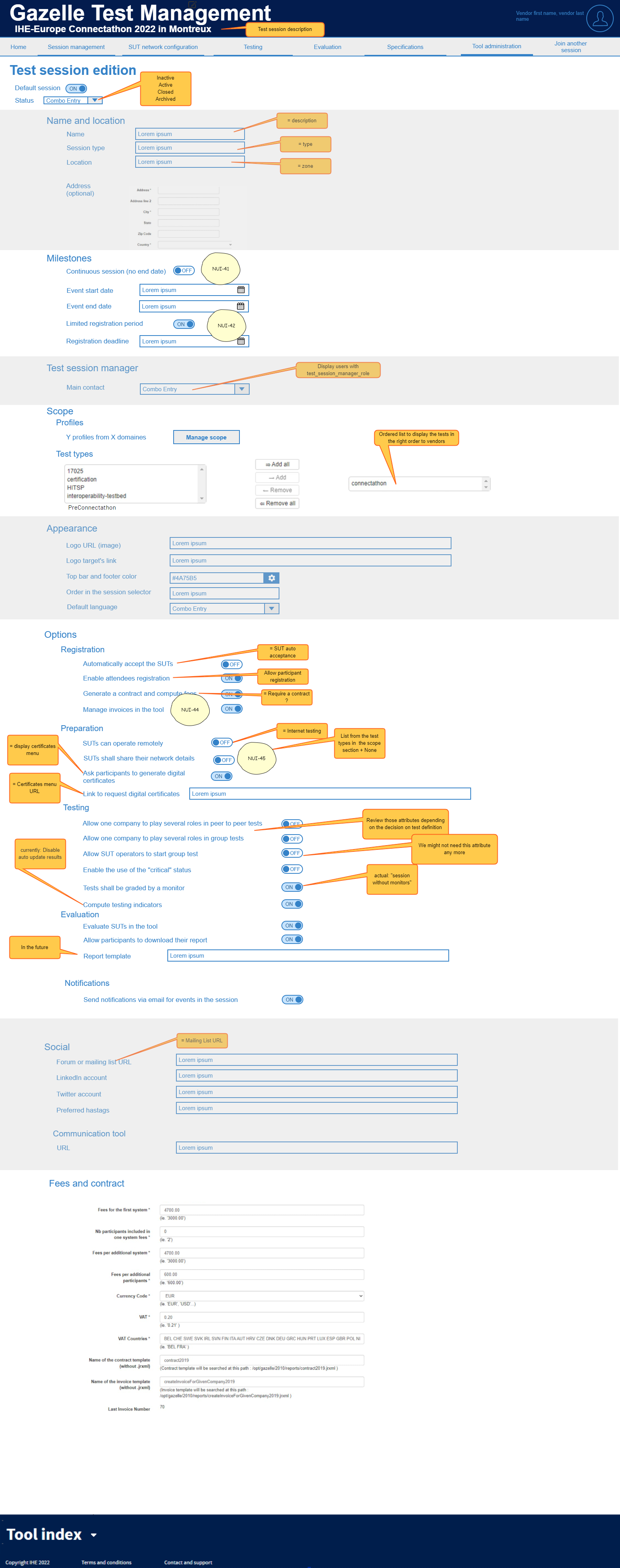The tool administrator shall be able to define new test session and to assign it to one or several test session managers.
The test session manager shall be able to configure the test session he is assigned to.
A test session can refer to a punctual test event, conformity assessment session, or continuous test session. In each case, in can be parameterized so that the operators and test session managers see content of interest in their context.
In particular, the test session:
- Shall have a name
- Shave have a type (free text because we do not know yet all the session's type we might need to handle and we do not process this field)
- Might have a location and an address
- Shall have one or several test session managers (among the users with the test_session_manager role)
- Might have a registration period, if so, the test session manager shall be able to define a deadline.
- Might have a start and an end date (if not it is said to be a continuous test session)
- Shall define a testing scope, the list of profiles that are offered for testing to the operators
In addition, the test session manager might want to inform participants about how to communicate and stay in touch on social media. He shall be able to define (if needed):
- The link to the forum or mailing list for the event;
- The link to the LinkedIn account of the test event's organizer;
- The link to the Twitter account of the test event's organizer;
- A list of hashtags to use on social media;
- The link to the communication tool (Zoho Cliq, or slack, or rocket.chat or something else).
For the test session in Gazelle Test Management to reflect the actual organisation of the session, the following options shall be available (true/false):
- Automatically accept SUTs, if checked, each system under test which is added to the session is set with status "accepted");
- Enable attendees registration (currently named "allow participant registration), if checked, the organisation owner can list the users who will attend the session;
- Generate a contract and compute fees (currently name "require a contract"), if checked, the TSM is invited to give the link to the contract template as well as the fee structure;
- Manage invoice in the tool, if check, the TSM and accounting users can access a "manage invoice" page;
- SUTs can operate remotely (currently named "internet testing"), if checked, the operator is allowed to input an IP address in the network interface for his SUTs;
- SUTs shall share their network details, if not checked, the pages related to the network configuration and SUT's network interfaces shall not be displayed;
- Ask participants to generate digital certificates (currently named "display certificate menu"), if checked, offer the TSM to add the link to the tool used to manage the digital certificates (currently named "certificates menu URL")
- Allow an organisation to play several rools in peer to peer tests, if not check, organisation cannot start tests that involved SUTs from the same organisation;
- Enable the use of the critical status, if checked the operator shall see the critical status when he sets the status of a test run;
- Testing is overseen by monitors (currently named "session without monitors"), if not checked, all the features related to the management of the monitors shall be disabled + operators shall be able to set a test run to status Verified, Failed, and Particially verified;
- Compute testing indicators (currently named "Disable auto-update results"), if checked, a cron run to update the list of AIPO results long with indicators;
- Evaluate SUTs in the tool, if not checked the Evaluation menu shall be hidden for the session;
- Allow participants to download their report
- Send notifications via email for events in this session
